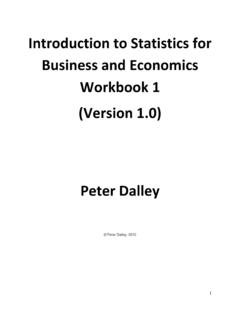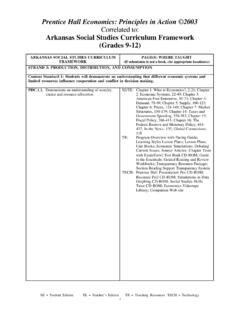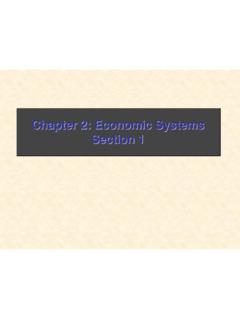Transcription of WB - Econ Fundies 2011-2012 Compressed
1 economics workbook | 1 BASIC ECONOMICS DEMIDRILLSF undamentals of economic Thinking Table of Contents I. Basics of Economics .. 4 II. Microeconomics ..16 III. Macroeconomics ..84 About the Author ..142 About the Editors ..142 Answer Key ..143 Jessica Raasch Arizona State University 07 edited by Dean Schaffer and Daniel BerdichevskyWilliam Howard Taft High School Stanford University re-edited by Chris YetmanCanyon del Oro High School DemiDec and The World Scholar s Cup are registered trademarks of the DemiDec Corporation. Academic Decathlon and USAD are registered trademarks of the United States Academic Decathlon Association. economics workbook | 3 IntroductionIt s not easy to learn economics from a textbook. In fact, it s not easy to learn economics, period. It s a social science, but it s filled with math and graphs.
2 It s an abstract field of study, but we read about it all the time in the business section as if economic theories were hard facts. If you ve never paid much attention to this thing we call the economy, it can be difficult to get started. That s where this workbook comes in. It s a special workbook , if I may say so myself. Yes, I m one of the authors and I m a bit biased, but I m not making this stuff up. It s special because we wrote it with you in mind, realizing that learning economics is tough. It s nothing like memorizing dates, names, and other information the way you do to prepare for the other Decathlon events. You have to dig in and play with the concepts in order to learn them. For that reason, we do things differently in the economics workbook . In the first three sections, we present you with short lessons, immediately followed by exercises to reinforce the material.
3 We emphasize concepts, rather than testable facts. In the fourth section, we follow the format of our other workbooks, using exercises to help you learn the material in the USAD guide on the Economics of the Great Depression. The lessons in the first three sections are short and generally more concise than what you find in our resources. They re meant to supplement not replace the textbooks and other materials you should be using to prepare for the economics exam. You could probably work through most of the workbookwithout referring to another text, but I would caution you against doing that. I studied economics when I was a Decathlete and I later went and got a degree in the subject. My experience has been that it is sometimes necessary to get several explanations of the same concept. This year, USAD has come out with a wonderful economics resource and I encourage you to reference it often as you work through this workbook .
4 Trust me, it will help. To learn economics, you have play with the concepts. If you re looking to win gold, my suggestion is that you take an active role in the learning process. Don t just read the material; draw the graphs, work through some algebra, and ask a lot of questions. We created the tutorial workbook format to help structure that kind of active learning, but you re certainly not limited to this text. You can also watch the news and make your own connections between real-world events and the lessons in your textbooks. That will help you. You can observe people so you can convince yourself that there is some truth in the laws of supply and demand, and that there are indeed predictable relationships between unemployment and economic events. That will help, too. And finally, you can talk about economics with your teammates, your parents, and your coaches.
5 That will probably help more than anything. Best of luck,JessicaECONOMICS workbook | 4I. Basics of Economics This section covers everything in Section I of the curriculum outline. If you are using USAD guides, please note that it roughly follows pages 6 9 of the USAD Economics Resource ASSUMPTIONS OF ECONOMICS ( )Economics is a study of decision-making why people make the choices they make, how they makethem, and what happens as a result. Sometimes economists look at what happens when whole groups of people make very similar choices, like when thousands stand in line to watch the latest Harry Potter film at midnight. Sometimes economists try to explain why a group of people simply can t seem to come to a decision, as when peace talks are delayed because no one can agree about the shape of the table for the meeting.
6 And other times, economists are just interested in the choices of individuals like you and me. An economist might examine what motivated your decision to read this workbook rather than sleep1. Or maybe she d be interested in my decision to write it rather than campaign to save pelicans from environmental disasters2. But at the end of the day, whether it s the decision to wage war or the choice between sleep and study, economics is nothing more than the study of choices. Before we get going, it will be helpful for you to be aware of some of the basic assumptions that underlie much of mainstream economic thought. There are four basic you need to understand: Scarcity is everywhere. Nothing is free. People are rational. Trade is good. There is no need to memorize these assumptions, but you should try to think about how things might be different if any one of them or all of them were untrue.
7 Let s look closely at each. Scarcity is Everywhere There just isn t enough stuff in the world for everyone to have as much of everything as they d like. In fact, that is the basic problem of economics: we have unlimited wants, but only limited resourceswith which to satisfy them. In other words, scarcity is the basic economic if a resource is given away for free, it is scarceif people want more of it than what is available to them. You can probably think of things that seem to be abundantly available to you now. For instance, you breathe all the air you need, and you probably think you get more calculus homework than you really want. But the fact is that you get calc homework because you met the prerequisites and you snagged one of a limited number of seats in a class. The poor, underprivileged souls in first-year algebra can t have any calculus homework because they re not in the class and your calculus teacher simply 1 Although she wouldn t have to think about it for very long.
8 Choosing economics over sleep might actually be one of the easiest and most obvious decisions in the history of time. 2 But for the record, you should know that I actually did adopt a brown pelican after the recent gulf oil spill (when I say adopt I mean, send $150 to a bird rescue agency in exchange for a certificate with a picture of ). economics workbook | 5doesn t have enough time to grade assignments for other it turns out, scarcity is everywhere. The people of the world suffer every day with less chocolate, fewer smart phones, fewer economists, and even fewer economics workbooks than they would like. Even calculus homework, like so many other things, is is what forces people to make the difficult decisions that we study in is FreeSome resources seem to be available to everyone, so we have trouble recognizing that they are indeed scarce.
9 Such goods are termed free goods. Air is the most common example, but, as you know, you can t get breathable air everywhere in the universe. You might not pay cash to get breathable air now, but when you start packing for your next trip to Pluto (presumably to get some quiet study time), you will probably have to buy some oxygen. Even on Earth, people pay to get oxygen in hospitals and oxygen bars. In fact, the air we breathe every day has a price tag, too, although it s a bit less obvious: we pay taxes to support the regulations that help keep our air of the basic assumptions of economic thought is that nothing is free, or to put it another way, that everything has a cost. Since resources are scarce, we have to give up something we already have in order to get something we want. If a gold medal in Economics is what you want, you will have to give up some time in order to get it.
10 In economics jargon, the act of giving up one thing in order to get something else is called a trade-off. Every choice requires some kind of trade-off. That is why economists sometimes say, There ain t no such thing as a free lunch3. Every time you choose to do something, you are effectively choosing not to do other things. That means there could be countless choices (to not do things) related to your choice. For example, by choosing to study Economics today, you chose notto study for any of the other objective events. You chose notto work on your speech, notto practice for your interview, and notto work on your essay. The opportunity cost of a decision is the value of the best alternative not chosen the value of the thing you could have had, but didn t. If looking through pictures of your friends friends on Facebook was the best alternative to an hour of studying economics, then the opportunity cost of studying was the value to you of seeing all those pictures4.









